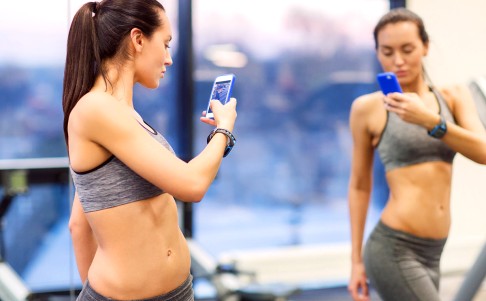Strip for a Healthy Selfie: new app asks users to shed inhibitions for the sake of fitness
A local couple have developed a photo app that asks users to shed their inhibitions in a quest to improve their bodies. It may seem like more selfie obsession, but Jeanette Wang discovers otherwise

But a new phone app developed by a Hong Kong-based couple puts a positive spin on the trend: by using selfies to motivate people to achieve their health and fitness goals, whether it's to lose weight, tone up, get fit or eat healthier.
Healthy Selfie, the brainchild of Joe and Charlotte Li, is a lot like popular photo app Instagram. You snap, share, hashtag and comment on photos, and build your own individual online community by following and being followed by other users. A "Fit Feed" keeps you updated on everyone in your social network.
Photos on Healthy Selfie, however, tend to show more skin and muscles, fruits and salads than those on Instagram.
The app also enables users to create "before-and-after" snaps, as well as a photographic food diary where uploaded dishes can be accompanied by a step-by-step recipe or a clickable link to the recipe on the web.
Within the first three weeks of its launch in January, the free app - currently compatible only with iPhone 5 and newer models - had more than 5,000 downloads and 11,000 photo uploads, says Charlotte Li, a former chartered accountant. "On launch day, the server was so inundated with downloads that it crashed."
"The key thing that differentiates Healthy Selfie from Instagram is the fact that it is a socially-acceptable platform for users to share the ups and downs of their fitness journeys without fear of trolling, humiliation or ridicule from friends and followers," she adds.
"Everyone using Healthy Selfie is on some variation of the same journey: to improve their bodies. They are therefore predisposed to being interested in solely health- and fitness-related content."
"My weight hasn't really changed on the scales - I was 62 kilograms [when I began using the app] and am 61kg now, but I've lost four centimetres on my waist, 3cm on my flanks, 5cm on my bum and 2cm on each thigh," says Molesworth, 27, from Birmingham in Britain.

Encouraging comments left by other users have kept her motivated, she says. Inspired by posts from others' food diaries, she's also become more adventurous with healthy cooking. Molesworth, who says she's neither a narcissist nor obsessed with her image, only posts headless selfies.
"The app appeals because it's purely based on maintaining a healthy lifestyle, takes you away from using the scales and helps you notice changes faster by physically seeing them when comparing photos," she says.
Being socially connected online can help dieters lose more weight, according to a recent Northwestern University study that appeared in January in the .
The less users interacted in the community, the less weight they lost. Users who did not connect with others lost about 5 per cent of their body weight over six months, while those with a few friends (two to nine) lost almost 7 per cent.
"Our findings suggest that people can do very well at losing weight with minimal professional help when they become centrally connected to others on the same weight-loss journey," says Bonnie Spring, an author of the study and professor in preventive medicine at Northwestern.
Needing motivation to get to the gym, Charlotte stripped down to her underwear and took her first body selfie. Unhappy with what she saw, she started a new fitness programme called German Body Comp and began eating "reasonably healthily".
Each week she'd take photos and weigh herself. At the end of six weeks, Joe, a freelance web developer, used Photoshop to splice the photos together for a comparison.
The app takes you away from using the scales and helps you notice changes faster by comparing photos
"The results were incredible - my body had completely changed - all in complete contradiction to the number on the scales, which had risen as I gained more muscle," she says.
Determined to create an app that made tracking and comparing selfies a quick and easy process, the couple started working on Healthy Selfie.
Although completely self-funded so far, the couple are working on their first round of funding through equity crowd investment platform Seedrs. In future, they plan to develop an Android version as well as offer in-app purchases.
Aesthetics aside, selfies could be useful in other aspects of tracking one's health. Researchers at the University of Rochester in New York, for example, in January revealed a computer program that turns any computer or smartphone with a camera into a personal mental health monitoring device.
The programme analyses selfie videos recorded by webcam as the person engages with social media for "clues" such as heart rate, blinking rate, eye pupil radius and head movement rate. The team was able to measure a user's heart rate simply by monitoring very small, subtle changes in forehead colour.
At the same time, the programme also analyses what the users posted on Twitter, what they read, how fast they scrolled, their keystroke rate and their mouse click rate. Using all the data, it categorises the user's emotions as positive, neutral or negative. The researchers hope to make the programme identify further defined emotions such as sadness and anger.
As more apps tap into self-portraits for health's sake, perhaps the selfie will eventually shrug off its bad rap.

